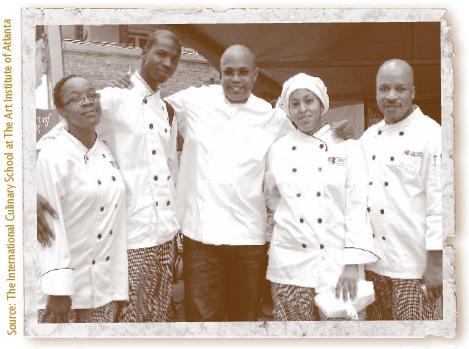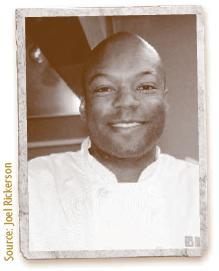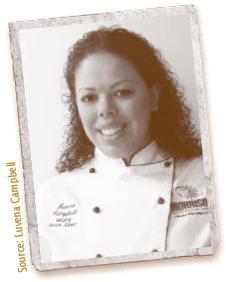America I AM Pass It Down Cookbook (42 page)

This is no regular culinary school or high-end cooking class. It is a culinary arts workshop that the city of Los Angeles, where I live, has asked me to develop using my culinary arts skills from my training as a professional chef. The goal is to use communal preparation of food and the ritual of dining together as a means to bring communities together that are struggling with gang violence and racial tensions, as part of the Los Angeles Summer Night Lights (SNL) program.
Mayor Villaraigosa launched the SNL program in 2008 to combat gang violence during summer months. This program engages all members of the community by providing job opportunities, free food, athletic leagues, cultural arts programming, and other positive activities for families from 7 p.m. to midnight— the peak hours of gang violence—in selected locations that are in high crime areas. In 2010, I joined the program, providing my culinary arts workshops at all of the 24 citywide SNL locations.
Each of these classes reminds me that food is a universal language that transcends all barriers and boundaries. It communicates the most simple and complex ideas and concepts while engaging the senses and emotions. What we eat and how we share our meals with each other defines our identity, tells our histories, and expresses our present—and our hopes and dreams of the future—as individuals and as a community. This is the power of food and the ritual of breaking bread together.
As a scholar, educator, and community advocate, I have always struggled to find the best means to reach all people and improve the communities I serve. Here in Los Angeles, communities segregate themselves and cross-cultural communication is a challenge. For me to work with multiethnic communities that face various issues, I had to develop a strategy that everyone could understand and embrace. Cooking has proven a powerful and universally effective tool for social change.
Culinary arts allows me to collaborate with a global community to creatively address many socio-economic challenges. Teaching reading and writing to adults who had given up on becoming literate, promoting self-reliance and independence for women who found themselves living on Skid Row, and encouraging self-worth and social responsibility for at-risk youth who are considering gang membership, have been some of the ways I have used culinary arts to improve the community.
The participants come to the classes excited but skeptical that they are about to create something special, let alone something special enough that others will admire. In a crisp pressed chef uniform, I go over the menu and the ingredients for the evening as nervous, uncertain smirks turn into big smiles and energetic chatter. At this point everyone is eager to dive into making their gourmet meal.
Conversation ensues effortlessly among strangers from different backgrounds, and together they embark on a culinary adventure that allows them to create freely. Laughter, eye contact, and helpful hints flow abundantly among the newly formed culinary family. They are fully engaged and empowered by the act of culinary communion. They show each other love and praise with no shame. There is nothing more powerful than surprising yourself with a new skill and sharing that skill with people who are just as excited as you are.
They admire each other’s edible artistic interpretations and happily offer compliments to people they do not know. They eagerly rush to show family, friends, and anyone who happens to be passing by what they have created and proudly exclaim, “I Made This!”
By the time all meals are made and people are indulging in their creations, no one seems to notice the bonds that have been forged. Strangers continue their conversations as they walk outside together, enjoying an interaction and fellowship with people they usually would not talk to in their own community. There are no enemies here—only a sacred table with a sacred feast prepared by a healing, sacred community.

GENERATION NEXT CHEFS

Chef Jeff with young chefs (left to right) Mical Terry, Nickalas Reid, Tara Gardner, and Donnell Jones-Craven, students at The International Culinary School at The Art Institute of Atlanta.
“Each one teach one” has been one of the most effective ways to school the next generation on how to get things done. In the past, cooking in the kitchen alongside relatives, friends, and neighbors established a permanent kinship and a cultural legacy. It was how each generation learned to develop their cooking chops. Today, in our fast-food nation, many young chefs of color are being introduced to their food heritage at culinary schools and are encouraged to reclaim those traditions. By exploring the African American food universe, young chefs learn to cook, taste, and create new worlds.
When generations cook alongside one another they are infused with an unbreakable bond. This is why I am committed to reaching back to give opportunities to the next generation of chefs, caterers, bakers, and home cooks—to continue the legacy of passing it down. In the section that follows, we salute this next generation of culinary artists for their passion, creativity, and commitment to our influential food history.

Mama and Mical’s Pickled Eggs
Riverside, California
SERVES 3 TO 6
Generation Next Chef

Mical Terry is a student at The International Culinary School at the Art Institute of Atlanta and a recipient of the school’s Chef Jeff Henderson Scholarship. Terry says her passion for food was instilled by her mother, who was raised in the West but remained a lover of down home soul. In Terry’s family there are many recipes, but she is committed to recreating family favorites with her own special signature added to the traditional flavors that mean so much.
1 18-ounce can of beets
16 ounces apple cider vinegar
1 teaspoon salt
2 jalapeno peppers
1 dozen eggs
1 32-ounce jar with seal
Place the beets, apple cider vinegar, teaspoon of salt, and jalapenos in a medium size sauce pan. Let mixture come to a simmer in order to marry the flavors. While waiting for cider mixture to simmer, boil and peel the eggs.
Once mixture begins to simmer, place peeled eggs in a 32-ounce jar and then pour the cider mixture over eggs. Place a piece of aluminum foil over the opening of the jar. Seal jar off and place in a room-temperature location for one week.
When seal is broken, you can eat and enjoy. The eggs should be purple all the way through to the yolk, and will have a bit of spice because of the jalapenos.
Sweet Water Creek Hush Puppies
Atlanta, Georgia
SERVES 4
Generation Next Chef

Joel Rickerson is a third-generation chef and restaurateur from Atlanta, Georgia. His father, Chef Joe Rickerson, has more than 30 years of experience in fine dining and personal services for some of America’s top restaurants and celebrities. Today, they co-own SPACE Atlanta Restaurant and Lounge, located in the historic West End area of Atlanta. Rickerson says Sweet Water Creek Hush Puppies were first created during slavery, and they often accompanied fried mullet because that was the only type of fish readily available to African Americans.
1 cup self-rising cornmeal
½ tablespoon black pepper
½ teaspoon salt
2 teaspoons chopped scallions
1 egg
4 teaspoons vegetable oil
½ cup milk
Mix all ingredients well. Let sit in the refrigerator for 15 minutes. Heat skillet with oil to 350° F. Scoop mixture up with a small ice cream scooper or tablespoon and place in the skillet. Once placed in oil, mixture will form into balls. Let cook for 8–10 minutes, then let cool for 2–3 minutes. Serve with tartar sauce.
Memphis Style BBQ Beef Tenderloin Sliders
Memphis, Tennessee
SERVES 10
Generation Next Chef

Luvena Campbell developed a love for cooking in her early 20s when she began working in a local restaurant as a server. Her passion for the culinary arts led her to pursue a bachelor’s degree in food service management from Johnson & Wales University. Campbell now works as a sous chef for Compass Group America, one of the nation’s largest food service companies. In the near future, she wants to take on the role of executive chef. Campbell likes this beef tenderloin recipe because it offers servings in small portions but still leaves people full and happy.